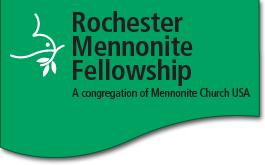Land Acknowledgement
The congregation of Rochester Mennonite Fellowship meets on the traditional homelands of the Onöndowa’ga:’ or Seneca People.* The Seneca Nation and Haudenosaunee Confederacy survived genocide by European colonists but lost approximately 2.5 million acres through a series of illegal land seizures by the State of New York that violated three treaties concluded between 1784 and 1794. These treaties formally recognized that the Haudenosaunee and the United States were separate sovereign nations with specific borders and established that both federal and international law upheld the Seneca Nation’s claim to its land and waters.
Perpetrators of colonial violence have sought to erase the connection that the Seneca Nation and the Haudenosaunee people have to this land and disregard the treaties the U.S. signed and which legally are still in effect. As a Christian church meeting in Rochester and as citizens of New York State, we acknowledge that we have benefitted from the breaking of promises and the theft of land. We also lament the historical and ongoing violence against the Seneca People, and New York’s continuing violation of their treaty rights.
We commit ourselves to learning the history of these lands, upholding Indigenous sovereignty when religious, state, and profit-making institutions violate it, and seeking guidance through the principles of the United Nations Declaration on the Rights of Indigenous Peoples.
*The Onöndowa’ga:’ (oh-nohn-doh-wah’gah) people are part of the Haudenosaunee (hoh-Dee-noh-SHOH-nee) Confederacy, which also includes the Tuscarora, Cayuga, Onondaga, Oneida and Mohawk Nations. Because their principal village was Osininka, other tribes referred to them by that name. White people changed the name to “Seneca.”
Short option
Rochester Mennonite Fellowship meets on the traditional homelands of the Onöndowa’ga:’ people. We acknowledge that as a church and as New York State citizens, we have benefitted from the breaking of promises to the Seneca Nation and the theft of its lands. We commit ourselves to learning the history of these lands and honoring Indigenous sovereignty.

No Response to “Land Acknowledgement”